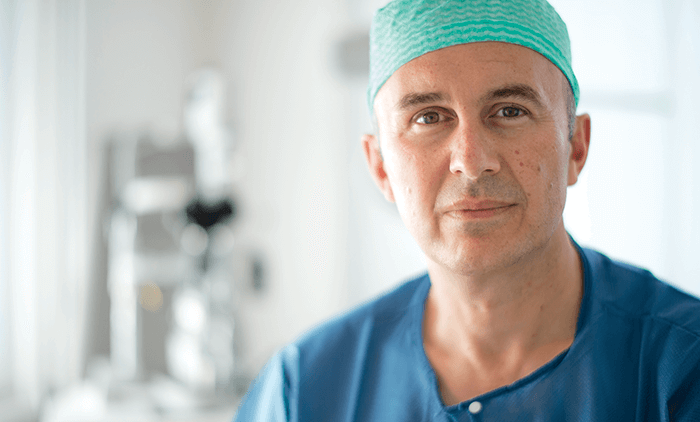
The change was inspired by my need to be fascinated by what I’m doing – coupled with the incredible enthusiasm of Theo Seiler. Shortly before I finished my residency in Zurich, Theo became chairman. Until then, I’d experienced relatively little mentorship. He passed on his love for the cornea, and I decided to follow it. Some people told me it was a foolish thing to do, especially as I already had around 20–25 papers on retina published, including a first-author cover story in Nature Medicine and a Nature Genetics co-authorship. At the time it may have seemed unwise, but looking back, I definitely don’t regret it.
The short answer is that I couldn’t possibly do it alone. A good team is essential – and the best teammate I have found is my wife, Nikki, who is also my best friend and partner in research and business. An idea alone is only part of the battle. I realized that I had two choices: I could keep my ideas to myself and accept that they might never be realized, or I could share them and become a collaborator working with other sites to implement them. We run a small team, and we have more ideas than we have manpower and hours in the day. Besides our in-house research, we decided to identify bright young researchers – people who can get involved, pick up our ideas and run with them. We help with aspects like protocols and ethical approvals, but they execute the study.
Honesty is extremely important to me – both professionally and personally. Of course, if there is a potential conflict of interest (when I’m involved in spinoff companies, for example), I always lay all of my cards out very openly on the table. It’s an approach that’s gained me respect in the field over the years – I always tell it how it is, whether that’s to my advantage or disadvantage, and people really respond to that.
I usually see patients from 8 am–12 pm and 1–5 pm, five days a week. At noon, I eat and try to do some work on manuscripts and talks and I try to leave two or three hours free a week over lunch to speak to my basic research team. I aim to be home by 6 pm, because it’s extremely important to Nikki and me that we spend time with our (still little) children and eat dinner together. At 8.30 pm when the children go to bed, we get back to work.
I’m anticipating completing the PACK-CXL trial, and getting a CE mark for the C-Eye device for crosslinking at the slit lamp and launching it commercially. I’d also love to take a three-week vacation with my wife and kids... Knowing how our lives usually go, these things will probably all happen simultaneously!
I believe peer recognition is hugely important, as is advancing the field. And I derive a deep satisfaction from being able to help predominantly young people with keratoconus. Money has never been a motivator for me. If it was, I’d have become a banker or something – you need to work with money to make money. Balancing work and life would also be a great success, and I’m still looking for that magic formula. But in all honesty, the simplest and most important motivation is to satisfy my own curiosity – it’s just lovely to be able to play in this huge sandpit of research and science.
Professionally, the most exciting moment was when I was published on the cover of Nature Medicine, exactly 20 years ago. Back then, we connected to the Internet by dial-up modem, and I remember coming home late one Friday night, hoping to view the Nature Medicine website; slowly – almost pixel-by-pixel – I saw the cover appear... We were on it and I remember yelling with joy! I joke that it’s a bit like the career of Orson Welles – you start out with this huge thing (Citizen Kane), and then for the rest of your career you’re trying to get that again!
You could be the greatest researcher on earth, but if you are an arrogant, unpleasant person, nobody will remember you. So I would like to be remembered as a good, approachable person who helped others advance – especially the younger generation. Of course, it would also be great to be remembered for advancing the field! If I had to pick just one sentence, I’d like to paraphrase the Pet Shop Boys – “I was never boring, because I was never being bored.”
